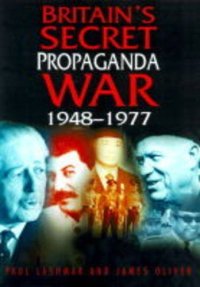
Ebook: Britain's Secret Propaganda War 1948 - 1977
Author: Paul Lashmar James Oliver
- Year: 1998
- Publisher: Sutton Pub Ltd
- Language: English
- epub
Using a vast array of techniques to influence world and domestic opinion IRD's activities mirrored and complemented similar CIA covert propaganda operations. Its operations extended across the world and took in newspapers, magazines, news agencies, book publishing, academia and radio stations. IRD also influenced the BBC's and Reuters' output of news stories. Using the "old boy network," IRD placed its people in many parts of the British media and academic world. On the home front IRD was deeply involved in British politics, notably through the dissemination of material by contacts in the Labour Party and the TUC where it sought to bolster anti-Communists against those identified as Communists and, in effect those less enthusiastic for the Cold War, the Atlantic Alliance and nuclear deterrence. Internationally it conducted operations in the Middle and Far East and in the Commonwealth together with specific campaigns in Greece, Malaya, against Nasser during the Suez Crisis and Suharto in Indonesia.
Britain's Secret Propaganda War is the first book to be written about IRD and represents an important chapter in the history of the Cold War. The narrative is driven by actual accounts of IRD covert operations and includes a number of "exclusives" that will help with publicity for the book. Paul Lashmar and James Oliver (the authors) have a significant private archive of IRD material and files collected by researchers over twenty years. They have interviewed a substantial number of those who took part, some of whom have since died.
The authors also reveal some of the journalists who moved effortlessly between MI6, IRD and national newspapers, like Chevins of the Daily Telegraph. They have also uncovered evidence of IRD's hidden hand in domestic British politics, overthrowing left-wing governments and assisting Britain's entry into the Common Market. In their conclusion the authors discuss the impact of IRD, both domestically and internationally, and raise significant questions about the morality of covert propaganda in a democracy.